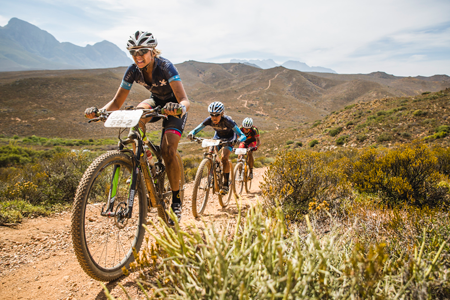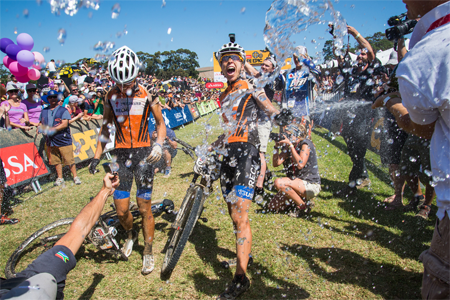
Women's Race Rule Changes
By Absa Cape EpicIn 2012 the Absa Cape Epic women’s race received UCI HC (beyond categorisation) classification and in 2014 it introduced equal prize money for the Women’s category. Now the Cape Epic has announced additional far-reaching and innovative changes to the rules governing the elite women’s race for 2016 and beyond.
From 2016 UCI-registered women will start in a separate group. According to the race organisers, this is being done to “create a fair racing environment”. The specific details of this – how long after the UCI-registered men they will start and how far ahead of the leading amateurs – “will be published in due course”, the organisers said in a note to leading women riders.
The Absa Cape Epic has also revised its rules about logos on shirts for the women’s teams. From next year a woman rider and her teammate may have different sponsor logos on their kit, although the colour of the shirts will still have to match. This is designed to overcome problems in the past where women from different trade teams could not ride together.
The changes have been warmly welcomed by top women riders and form part of the progression of the category since the sponsorship by Sasol in 2014, equalising the prize money for the Women’s category to that of the Men's.
Norwegian mountain biking legend Gunn-Rita Dahle Flesjå said: “This is great news for the cycling community in general. Separate start batches have a important symbolic meaning for all women, and it’s a clear message that sports should be played fair at all times.”
The Olympic gold medallist and multiple world champion added that “allowing personal sponsors on a jersey makes it much easier for women riding for separate trade teams to take part in the race”. Dahle Flesjå took part in the Absa Cape Epic in 2015 but withdrew after her partner got sick.
Switzerland’s Ariane Kleinhans, winner of the Women’s category with Denmark’s Annika Langvad in both 2014 and 2015, paid tribute to the race: “It is great news that the Absa Cape Epic is always open to feedback from the riders, and willing to improve the race to make it a more competitive and interesting in the women's racing.”

Photo courtesy of Absa Cape Epic.
Seven time Absa Cape Epic finisher and former Women’s category winner Hanlie Booyens also enthused about the changes: “The fact that the staff at Epic HQ listen to feedback and strive to keep evolving is commendable indeed. A separate start group for the UCI ladies will keep the racing much more open and fair.”
Absa Cape Epic spokesperson Chris Whitfield explained that the new start batch was being introduced “to ensure that the women professional teams start on an even footing each day”.
“In the past a team that fell back on one particular day would start in a batch further back in the field on the next, making it very difficult to make up lost time and effectively handicapping that team.”
“It will improve the women’s race as a spectacle too,” he added.
The new rules about logos would ensure that strong pairings of women could ride together “and lead to the women’s racing becoming even more competitive”, said Whitfield.
UCI-registered riders are only allowed to receive assistance on the route from riders in the same category.
The rule changes at the Absa Cape Epic over the 12 years since it was launched have often been based on rider feedback, “which we take extremely seriously”, said Whitfield.
An example of this was the introduction of the Outcast jersey for professionals whose partners withdraw from the event. Back in 2009, if a UCI rider could not continue racing, his team mate had to withdraw from the race too. The Outcast jersey enables professional riders to complete the event but without interfering with the racing at the front of the field. This was suggested by New Zealand professional rider Kashi Leuchs after his partner withdrew in 2009.
The event actively encourages such feedback from riders after each race.

Photo courtesy of Absa Cape Epic.
The Absa Cape Epic’s team-based stage race model was unprecedented when it was launched in 2004 and there were no specific UCI rules for this type of event: the race organisers had to evolve them over the years. This has resulted in constant change and development.
“In recent years we have placed a significant emphasis on the women’s race and the consequent improvement in the field demanded that we review the rules relating to the category,” said Whitfield.
* The 2016 Absa Cape Epic stage race takes place from 13 to 20 March and the much anticipated route will be announced at the official route launch gala dinner on 14 October 2015. The 2016 race will host the 100th stage in the history of the event on Tuesday 15 March.
TRIATHLON
 Top International Professionals enter Challenge Wanaka
Top International Professionals enter Challenge Wanaka
Challenge Wanaka continues to attract triathlon's big names to the shores of Lake Wanaka in 2019, with some of the world's best confirming their participation. American triathlon powerhouse, Andrew Starykowicz will be certainly pushing the envelope in Wanaka.
 Top International Professionals enter Challenge Wanaka
Top International Professionals enter Challenge WanakaChallenge Wanaka continues to attract triathlon's big names to the shores of Lake Wanaka in 2019, with some of the world's best confirming their participation. American triathlon powerhouse, Andrew Starykowicz will be certainly pushing the envelope in Wanaka.
Saturday, 5 January 2019
CYCLING
 Captivating Finishes at BDO Lake Taupō Cycle Challenge
Captivating Finishes at BDO Lake Taupō Cycle Challenge
Epic results unfolded today at the 42nd annual BDO Lake Taupō Cycle Challenge.
Epic results unfolded today at the 42nd annual BDO Lake Taupō Cycle Challenge.
Monday, 26 November 2018
MULTISPORT
 Wanaka athlete crowned 25thPeak to Peak supreme winner
Wanaka athlete crowned 25thPeak to Peak supreme winner
Stunning bluebird weather greeted competitors at the 25thannual Torpedo7 Peak to Peak multisport race Saturday.
 Wanaka athlete crowned 25thPeak to Peak supreme winner
Wanaka athlete crowned 25thPeak to Peak supreme winnerStunning bluebird weather greeted competitors at the 25thannual Torpedo7 Peak to Peak multisport race Saturday.
Monday, 13 August 2018
TRIATHLON
 Taupo named as finalist in race to host 2020 Ironman 70.3 World Championship
Taupo named as finalist in race to host 2020 Ironman 70.3 World Championship
IRONMAN, a Wanda Sports Holdings company, announced today that Perth, Western Australia and Taupō, New Zealand have been named finalists to host the IRONMAN®70.3® World Championship triathlon which will rotate to the Oceania region in 2020.
 Taupo named as finalist in race to host 2020 Ironman 70.3 World Championship
Taupo named as finalist in race to host 2020 Ironman 70.3 World ChampionshipIRONMAN, a Wanda Sports Holdings company, announced today that Perth, Western Australia and Taupō, New Zealand have been named finalists to host the IRONMAN®70.3® World Championship triathlon which will rotate to the Oceania region in 2020.
Wednesday, 13 June 2018
News Index »
